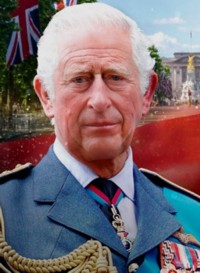A New King
So long had she reigned, that few among my friends and acquaintances, and none of the next generation, remember the death of King George VI.
Had he a son of any age, for example instead of Margaret, then we would have had another King.
That's no longer the case. The succession was changed in 2015 by the British Parliament and, after a 2011 agreement, by the other 14 Parliaments of countries having the Windsor heirs as monarch, to accept daughters equally and to allow Roman Catholics (and those having other religions or none) as consorts.
But it might surprise some that the current succession is not British at all.
The previous, line of succession, from the Tudors and Stewarts, was broken when Charles II (he who restored the monarchy) died in 1685 and his Roman Catholic brother ascended to the throne.
England was by then strongly Protestant and so outraged were the people, and thus the Parliament, at his attempts to reintroduce Roman Catholicism, that the Dutch William of Orange, the husband of Mary (daughter of James and initially second in the line of succession), was invited to invade and to depose James II, in the 'Glorious Revolution'. William became William III of Britain and ruled along with Mary.
In 1689 the Bill of Rights would provide that: henceforth the new monarch must rule with the consent of Parliament, and he or she is subject to a raft of constraints. Parliament thus removed the concept of absolute monarchy and put aside the medieval belief in the Divine Right of Kings. According to this doctrine a king's soul, is created in Heaven by God, prior to conception, and is assigned to a ruler's mortal being at conception thus pre-anointing them to rule. Sometimes this divine authority only becomes apparent following the truly anointed one successfully sizing the crown from a pretender. This doctrine, that was held to be infallible as recently as Tsar Nicholas II in 1914, has made Christianity the bedfellow of totalitarian rulers, throughout Christendom, for over a thousand years and for a good part of that time likewise empowered the Bishops and the Pope.
As William and Mary had no children together, in 1701 Parliament enacted the Act of Settlement that requires that: the British monarch must be a descendant of the German Princess Sophia (the nearest Protestant heir to William of Orange), and be in communion with the Church of England.
Again, it was the now ascendant Parliament that set this new law. These changes in belief went hand-in-hand with the Enlightenment and our growing awareness that the Earth in not the centre of the Universe.
Constitutional monarchy thus evolved; and 'across the pond' the American Revolutionaries (Thomas Jefferson, Benjamin Franklin, John Adams et al) would see no reason at all for this mystical inheritance of authority, no longer the preserve of God, and would decide on an elaborate (and flawed) method of electing their king. In the process, they would decide to rename 'him' their President (women were disenfranchised and effectively excluded).
In the meantime, the British Parliament continued to further constrain their monarch, who would soon have far less power that the US President. Thus by 1788, when Australia was settled by the British - some would say 'invaded' - the process was almost entirely in the hands of the British Parliament.
The initial governors in the Australian colonies, who were otherwise autocratic rulers, could nevertheless be, and sometimes were, removed by appeals made by colonists to the Parliament in London. From 1840 onwards, the Australian colonists wrested increasing democratic rights from the British appointed governors. So, by 1864, New South Wales had a functioning Parliament. Following similar advances that had already been made in Canada.
So why has the hereditary Sovereign been retained, long after our National Parliament, together with the local Judiciary, became the only source of governance in Australia (and for that matter the Parliament is effectively all-powerful in the United Kingdom)? Put simply, because, by much trial and error, it 'sort of' works.
It was Churchill who remarked:
|
'Many forms of Government have been tried, and will be tried in this world of sin and woe. No one pretends that democracy is perfect or all-wise. Indeed it has been said that democracy is the worst form of Government except for all those other forms that have been tried from time to time.… ' |
During the past century, Australia, together with Canada and New Zealand, the United Kingdom and along with other similar constitutional monarchies like Sweden, the Netherlands and Denmark, has demonstrably done better for its citizens, in terms of social support, health, education, longevity and lifestyle, than less effective systems of government.
And as Australians said (at a referendum) during the reign of Good Queen Bess: 'if it ain't broke don't fix it'.

